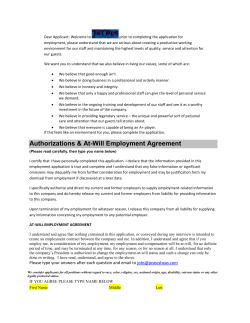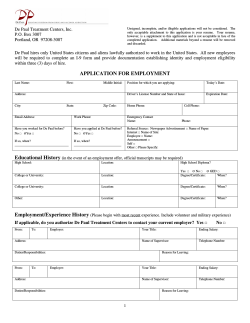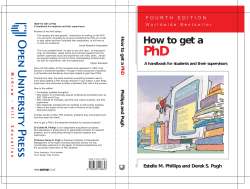
HOW TO CONDUCT MASTER PROJECT
HOW TO CONDUCT MASTER PROJECT Dr. Nor Azwadi bin Che Sidik Head of Postgraduate Studies Faculty of Mechanical Engineering Universiti Teknologi Malaysia 1 INSPIRING CREATIVE AND INNOVATIVE MINDS Master of Engineering (Taught course) 10 credits (25%) –Mech. 7 credits (17%) – Adv. Man. Fact. 7 credits (17%) – Marine Tech. 10 credits (25%) – Materials Eng. 7 credits (17%) – Industrial Eng. 2 RULES and REGULATION Master of Engineering (Taught course) Before registering for Master project I, you must complete at least 3 faculty courses complete Research Methodology or take concurrently. You must take Master Project I and II in two different semester (but not necessary in two continuous semester) 3 RESEARCH TOPICS Master of Engineering Research title 1) Student propose own research title – – – – – Decide research interest See Program's Coordinator or Head of Postgraduate Studies to decide suitable supervisor Discuss with supervisor to decide title, objective and scope Download the form from FKM postgraduate website Fill up the form and submit to postgraduate office 4 RESEARCH TOPICS Master of Engineering Research title 1) Select the title from the list – – – – – Get the list from FKM’ postgraduate website or notice board Get the topic selection form from postgraduate office Fill up the form and get the supervisor’s signature Submit the form to postgraduate office (Form must be submitted to postgraduate office before end of registration period) 5 MASTER PROJECT 1 EVALUATION METHOD Master of Engineering (Taught course) Seminar – 25% (Panel of Examiners) Problem identification – 20% Literature Review – 30% Research Methodology – 30% Response to question – 10% Overall presentation – 10% 6 MASTER PROJECT 1 EVALUATION METHOD Master of Engineering (Taught course) Draft Evaluation – 20% (Supervisor) Problem identification – 2% Appropriateness of literature survey – 6% Proposed research methodology – 4% Organization - Clearly identified purpose & approach, content organization, topic transition, appropriate introduction and conclusion – 4% Presentation - Easy to read, grammatically correct, uniformity of writing style – 2% Layout/Visual - Graphics, quality, uniformity of document design and layout– 2% 7 MASTER PROJECT 1 EVALUATION METHOD Master of Engineering (Taught course) Implementation – 55% (Supervisor) Log book and attendance – 10% Student's attitude and interest – 10% Literature awareness – 15% Work planning and execution – 20% Effort, independency and critical thinking – 20% Problem identification and proposed solution method – 20% Overall capabilities - 5% 8 MASTER PROJECT 2 EVALUATION METHOD Master of Engineering (Taught course) Seminar – 20% (Panel of examiners) Overall presentation – 15% Engineering and Technical Content – 30% Results analysis and discussion – 35% Response to question – 20% 9 MASTER PROJECT 2 EVALUATION METHOD Master of Engineering (Taught course) Draft – 40% (Supervisor) Topic Mastery – 4% Appropriate level of detail – 4% All requested deliverables included – 8% Completeness of analysis & Data Interpretation – 12% Organization of draft – 4% Presentation - easy to read, grammatically correct, uniformity of writing style – 4% Layout/Visual - Graphics, quality, uniformity of document design and layout – 4% 10 MASTER PROJECT 2 EVALUATION METHOD Master of Engineering (Taught course) Implementation – 35% (Supervisor) Log book and attendance – 5% Student's attitude and interest – 10% Work planning and execution – 10% Data Collection – 15% Effort, independency and critical thinking – 20% Analysis and discussion – 20% Overall capabilities - 20% 11 MASTER PROJECT 2 Project Paper = 5% Students are requested to submit a summarized of research written in journal format http://www.fkm.utm.my Submit the project paper (soft copy burnt in CD) to the postgraduate office 3 days before seminar 12 HOW TO DO RESEARCH (Master Project I) Week 1 Buy log book from postgraduate office (RM3.00) First meeting with supervisor Plan your research – draw flow chart and Gantt chart 13 14 HOW TO DO RESEARCH Week 2 to 7 Second meeting with supervisor Discuss results from literature study Reference 1: Title: Numerical study of …. Journal: Journal of Applied Science Volume: 3 Issue 1 Page: 1-16 Author: Nor Azwadi C. S. and Tanahashi, T Investigate numerically using lattice Boltzmann doule population method of the phenomenon of fluid flow in microchannel. Range of Knudsen number is 0.01 to 0.1. Reynolds number equals to 500. Validation of results with experiment. 15 HOW TO DO RESEARCH Week 2-7 Reference 2: Title: …. Journal: Volume: Page: Author: Summary: Number of reference: between 30 to 50 references Start writing thesis: Chapter One (introduction) 16 HOW TO DO RESEARCH Week 8 Eighth meeting with supervisor Select main reference papers Conclussion from literature review study Define problem statement: Method has never been applied to study…… (add the significant of the study) All the available methods are not accurate, inefficient…. Not well understood about certain phenomena Define significant of your research Redefine the scope of your research Write thesis Chapter Two : Literature Review 17 HOW TO DO RESEARCH Week 9-11 Research methodology Study current numerical formulation, experimental method, analytical theory, etc (from main reference) What is your new contribution. (Accuracy, efficiency, improvements, relevant to current demand,etc) Write thesis Chapter Three: Research Methodology 18 HOW TO DO RESEARCH Week 12-14 Obtain preliminary results simple numerical test using proposed method Redo the numerical test using current method Simple experiments …… Write thesis Chapter Four: Results and Discussion 19 HOW TO DO RESEARCH Week 15 Submit draft to your supervisor Preparation for Seminar Prepare handout (powerpoint presentation) to be distributed to the examiners 20 Master Project II First week Draw Gantt chart Second week-14th week Continue research Write thesis (refer Thesis Manual) 21 How to become a good post graduate student 22 The Critical Success Factors Good and Understanding Supervisor/s Conducive Environment Passionate on The Research project Personal Aims Knowing Own Strength and Competencies Set Personal Objectives 1. Identify what is stopping you from achieving your goal or things that concern you 2. Identify what will help you achieve your goal 3. Identify the resources which might help you 4. Now set some deadlines Characteristics of Outstanding Students Characteristics of Mediocre Students Work habit Uses time efficiently and is willing to work extra hours. Performed to the highest standards. Proactively initiates experiments. Work habit Has a rigid view of research as a “9 to 5” job. Takes shortcuts on laboratory experiments. Only performs experiments told by supervisor. Journal reading Actively and continuously performs literature searches to independently locate journal articles. Journal reading Reads only journal articles provided by advisor or other students. Research hypotheses Independent and continuously formulates hypotheses for both student’s own project and other related project. Research hypotheses Content to work on research hypotheses developed by research advisor or others. Writing Continually writes, including maintaining updated literature review of pertinent topics, writing journal publications and reports Writing Only write when forced by supervisor Characteristics of Outstanding Students Characteristics of Mediocre Students Publication Realizes that publication of research results is paramount, and focuses considerable effort in developing and writing manuscripts. Continuously develops new publication ideas and proactively approaches supervisor with potential manuscripts. Publication Looks at publication as an afterthought to the experiments. Minor effort put forth in developing manuscripts and assumes advisor will rework mediocre manuscript Problem solving Looks at research problems as an opportunity to grow and learn. Develops potential solutions to problems and discusses them with supervisor. Problem solving Comes to supervisor seeking solutions to research problem Teamwork Teamwork Understands that the collective output of the laboratory is a key component of the student’s own success, and therefore willingly assists others in the lab. Focuses solely on their own research Managing Relationship with Your Supervisor This relationship can be the most rewarding and most frustrating aspect and it is likely that you will experience both aspects at some time. It is not uncommon for misunderstandings to arise between student and supervisor during the postgraduate studies. Always remember that your supervisor shares an important goal with you – the successful completion of your degree. In this area they will almost certainly have your best interests at heart. It is up to you to discover the specifics of what your supervisor expects from you, but in general terms you should: The Important Aspects Tips for Solution Be Independent Do not use your supervisor to set your objectives; produce project plans, analyze your findings, or as a spell checker for your thesis! Arrange formal supervisory meetings Remember that your project is only one of many constraints on your supervisor’s time Plan for meetings It might be useful for your supervisor to know what you want to discuss, so don’t be afraid to send information in advance. Be honest The study is a period of TRAINING. You are not expected to get everything right first time and talking through your mistakes will give you the benefit of other people’s experience. Although it may be uncomfortable, you will ultimately gain the respect of your supervisor. Keep a sense of perspective As a trainee researcher you must expect to receive feedback and criticism. The purpose of this is to improve your performance: you should try not to take personally. Follow your supervisor’s advice Challenge their suggestions with your own if you feel you have a better solution, but never ignore advice. They’ve been doing this a lot longer than you have! Don’t wait to be told Am I doing enough research? Are these results credible? Am I planning my work effectively? Am I using the literature appropriately? Show that you are enjoying research Your research is also part of your supervisor’s research portfolio. This is their passion and they can feel insulted when their students aren’t enthusiastic about their work. Meet deadlines Particularly those set by your supervisor. Common Problems The Common Problems Possible Solution Strategies Laziness/lack of motivation Set short term task; Get someone to help; Identify what motivates you; Give yourself regular rewards Lack of self confidence Try to stretch yourself; Try new things; Don’t undersell yourself Poor time management Look at your time stealers and see how they can be reduced; Set realistic aims; Allow time for reflection No focus or direction Start by increasing your self awareness; Try lots of different experiences and eliminate the ones you dislike; Keep open minded Limited support Build your own support network; Get a mentor; Try and work in teams; Improve your relationship with your supervisor The Common Problems Possible Solution Strategies Comfort zone Recognize your comfort zone; Try continually to stretch yourself; volunteer for presentations; Take on new responsibilities. Fear of failure/taking risks Learn more from your failures than successes; Don’t take it Personally; Remember that you are TRAINING to be a researcher. Lack of relevant experiences Identify where your gaps are; Creatively explore all options; seize opportunities - Maximize your impact as a PhD/MSc student. Thank you 31
© Copyright 2025





















